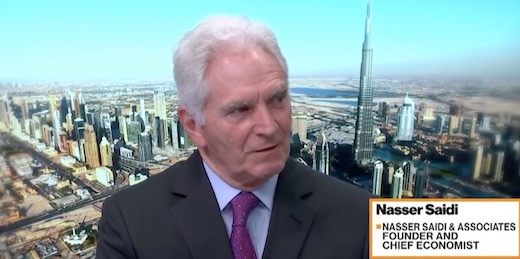Dr. Nasser Saidi’s comments (below) appeared in an Arab News report titled “Lebanon’s damning McKinsey report: how the experts reacted”, on January 7, 2019. The full article can be accessed here and here; the Arab News report can can be downloaded here.
One of the damaging figures reveals that Lebanon’s residents spend 50 percent more time than needed on congested roads, only 15 percent of which are in good condition. It also discloses that Lebanon’s infrastructure ranks 113th out of 137 countries.
“These numbers come from a variety of sources like the World Bank and others, so these have been assessed by various international parties,” Dr. Nasser Saidi, former chief economist and head of external relations at the Dubai International Financial Center, told Arab News.
“What’s more important is the cost of this in terms of productivity and income, because when you spend time on the road you aren’t producing anything, so congestion costs are very large in terms of both loss of business opportunities, lost income and lost productivity.”
Lebanon’s perceived corruption was shown to have increased by 26 points since 2012 to 146 out of 180.
“In terms of governance, it has been deteriorating over the past five to six years on a continuous basis,” Saidi said. “It’s corruption, bribery and nepotism. In all reports on transparency and corruption, Lebanon is unfortunately one of the most corrupt (places) in the world, and the importance of it is not only that we want to be able to fight corruption, but that it has become a cancer and it is so pervasive.”
He emphasized the issue as it is a major contributor to public finance and the budget deficit. “Corruption is directly related to government procurement and government contracts as well as government revenue,” he said. “So there is widespread tax evasion, and corruption is at the core of Lebanon’s large budget deficit, which was close to 11 percent in 2018 and likely to be the same or higher in 2019… The economic and fiscal impacts are extremely important.”
“If you want to measure the real damage that the civil war and the (Israeli) occupation have done to the country, it’s where Lebanon stands vis-a-vis countries that were equivalent to it before the war,” he added. “So it has regressed a lot by that measure.” Saidi said the poor quality of statistics in the country needs to be improved as the central statistics office lacks resources and figures on key areas including GDP and investment.
He said the lack of field productivity growth and investment means it is unsurprising that there has not been much of an increase in per capita income or real GDP.
The McKinsey report highlighted the country’s education system, deeming it to be of low quality and in decline. It said many skills are not being taught to suit labor force needs, partially because the curriculum has not been upgraded since 1997. Experts, however, said this is only the case for public sector schools and universities.
“The picture is diverse and there’s a big gap between public and private education,” Saidi said. “The major private sector universities are St. Joseph, the AUB and the LAU, which are able to deliver competitive quality education. The evidence for that is that our graduates are able to go to top-notch universities internationally.” But the problem is that it is mostly elites who can afford high-quality education, leaving behind most of the population, including Syrian refugees, he said.
He pointed the finger at the Arab world as a whole. “You need to think of two things: Education for employment, which should give you skills to be able to get jobs, and digital education for digital employment, because economies on a global basis and in the Arab world are increasingly going to have to move to become digital.”
In terms of the country’s diaspora and its $6.9 billion in remittances sent back to Lebanon, the report said they are not largely channelled into productive areas.
“There’s very little public investment, and all remittances and the capital coming in from the diaspora go into bank deposits, treasury bills and to finance the budget deficit,” Saidi said. “We have one of the highest levels of debt to GDP in the world, in excess of over 158 percent, which makes it the third most indebted country in the world after Japan and Greece.”
He attributed the problem to very little public investment, which trickled down to poor infrastructure performance. “It’s all going to finance wages, pensions and interests on public debt,” he added, calling it a resource curse due to the government’s dependency on it. “They’re happy to pay high rates just to attract them. Had we not had them, they would’ve had to adjust on their own and had fiscal reform.”
The main issues at hand, he believes, are fiscal reform and corruption, cutting down the budget deficit and the level of public debt.
Comments on McKinsey's Lebanon report in Arab News, Jan 2019
9 January, 2019
civil war corruption education governance infrastructure Lebanon McKinsey public finance Remittances
read 3 minutes
Read Next
TV and radio
Bloomberg’s Horizons Middle East & Africa Interview, 17 Jul 2024
Aathira Prasad joined Joumanna Bercetche on 22nd July, 2024 as part of the Horizons Middle
18 July, 2024
media page
“A GCC spaceport could bring galactic gains”, Op-ed in Arabian Gulf Business Insight (AGBI), 4 Jul 2024
The opinion piece titled “A GCC spaceport could bring galactic gains” was published in the
5 July, 2024
media page
“Central Bank Digital Currencies: Will they replace the cash in our wallets?”, Op-ed in The National, 30 Jun 2024
The article titled “Central Bank Digital Currencies: Will they replace the cash in our wallets?”
30 June, 2024






